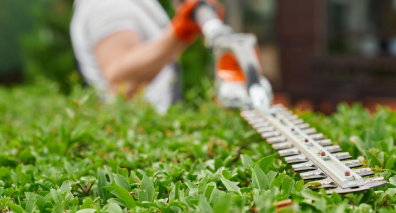
Our skilled staff will take care of all setup-related tasks after the design is complete, including site preparation, soil preparation, planting, hardscaping, and irrigation installation. To guarantee enduring beauty and usefulness, we exclusively utilize the best plants and resources. You can rely on Garden Gate to turn your outdoor area into a breathtaking haven that you can enjoy for many years to come.




I am so grateful to the Garden Gate for the amazing transformation of my patio space. My vision was transformed into a stunning garden design that is the talk of the neighborhood by their professional team. Their dedication to quality and attention to detail were apparent at every stage, from the first consultation to the last installation.
I just had the pleasure of designing my garden with the help of the Garden Gate, and I am really pleased with the outcome. I'm overjoyed with my lovely new garden and heartily endorse their offerings!
It was a true pleasure working with Garden Gate .Every aspect of the project, from the hardscape element arrangement to the plant choices, was meticulously planned and carried out.The outcome has above my expectations, and I am appreciative of their professionalism and commitment in realizing my garden fantasies."
From the beginning to the end, working with the Garden Gate was enjoyable. My garden design was precisely a reflection of my preferences and style thanks to the individualized care and attention to detail offered by their staff. They took the time to comprehend my idea and used their creativity and knowledge to make it a reality.
Consider factors such as sunlight exposure, soil quality, drainage, and proximity to water sources. Choose a spot that receives at least 6-8 hours of sunlight per day for most vegetable and flower gardens. Ensure the area has good drainage to prevent waterlogging, and test the soil pH and fertility levels if possible.
Essential tools for gardening include a shovel, rake, hoe, hand trowel, pruners, watering can or hose, and gardening gloves. Depending on the size and type of garden, you may also need a wheelbarrow, spade, garden fork, and other specialized tools for tasks like planting, weeding, and pruning.
Start by removing any weeds, rocks, or debris from the planting area. Loosen the soil with a garden fork or tiller to improve aeration and drainage. Amend the soil with organic matter such as compost, aged manure, or peat moss to improve fertility and soil structure. Consider conducting a soil test to determine pH and nutrient levels and adjust as needed.
Embrace sustainable gardening practices such as composting kitchen scraps and yard waste to create nutrient-rich soil amendments. Avoid chemical pesticides and fertilizers in favor of organic alternatives, and consider planting native species to support local wildlife and promote biodiversity.
Beginners may want to start with easy-to-grow vegetables and herbs such as tomatoes, peppers, lettuce, spinach, carrots, beans, basil, mint, and parsley. These plants are relatively low-maintenance and can thrive in a variety of growing conditions, making them ideal choices for novice gardeners.
Water plants deeply and evenly, ensuring the soil is moist but not waterlogged. Avoid overhead watering, which can promote disease and waste water. Mulch garden beds to retain moisture, suppress weeds, and regulate soil temperature. Monitor plants regularly for signs of pests, diseases, or nutrient deficiencies, and take appropriate action to address any issues.
Opt for compact or dwarf varieties of plants that take up less space but still produce a bountiful harvest. Utilize vertical gardening techniques such as trellises, stakes, and hanging baskets to grow vining plants like tomatoes, cucumbers, and beans. Consider interplanting compatible crops or using succession planting to make the most of limited space. Additionally, container gardening allows you to grow plants on patios, balconies, or other small areas where traditional gardening may not be feasible.
In the spring, focus on soil preparation, planting, and establishing a watering routine. In the summer, monitor your garden for pests, diseases, and water stress, and provide shade or mulch to protect heat-sensitive plants. In the fall, clean up garden debris, harvest any remaining crops, and prepare beds for winter by adding mulch or cover crops.
Gardengate is your one-stop shop for building a vibrant outdoor paradise. Whether you’re an experienced gardener or just starting out, we have a wide selection of plants to fit your needs and interests.